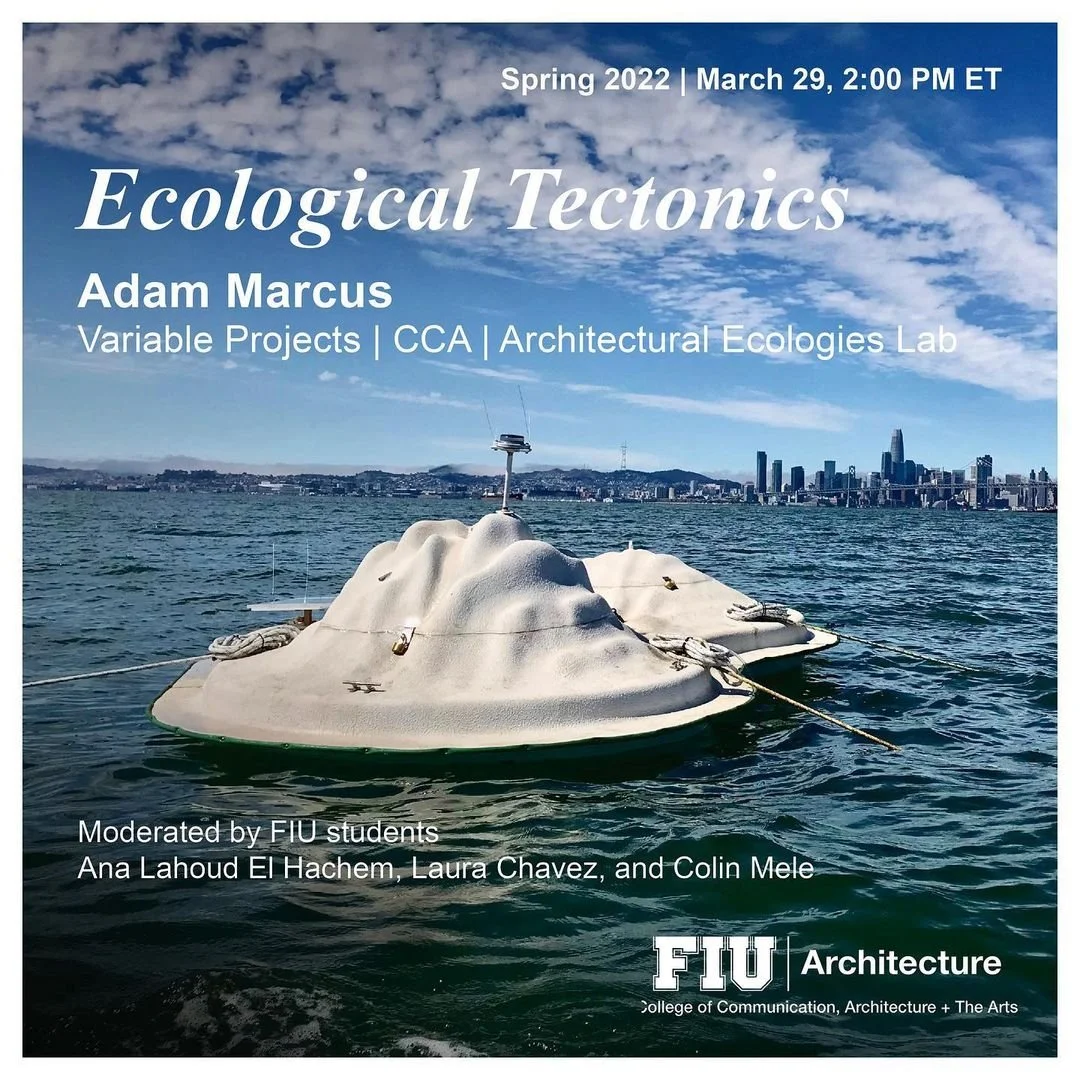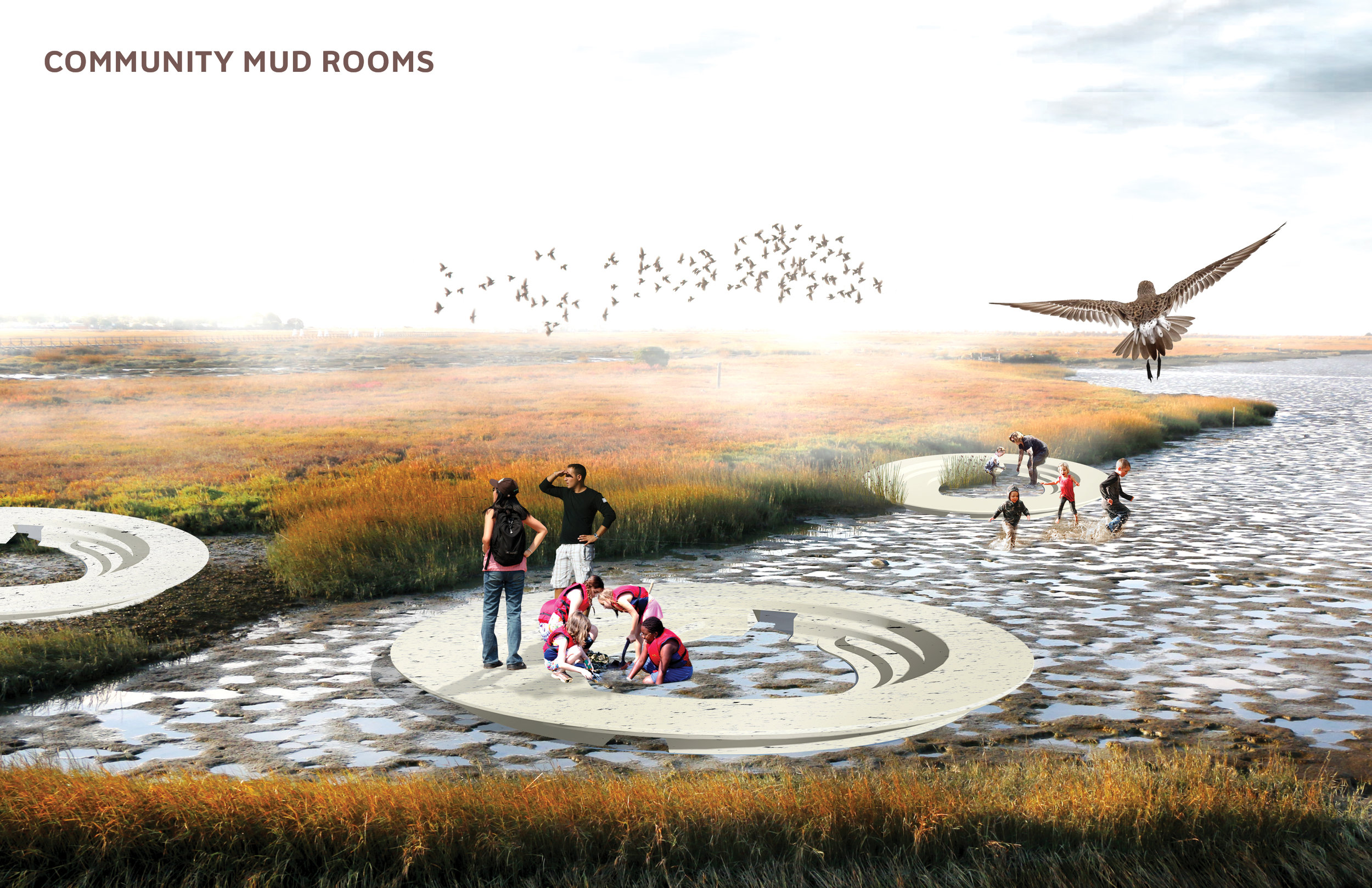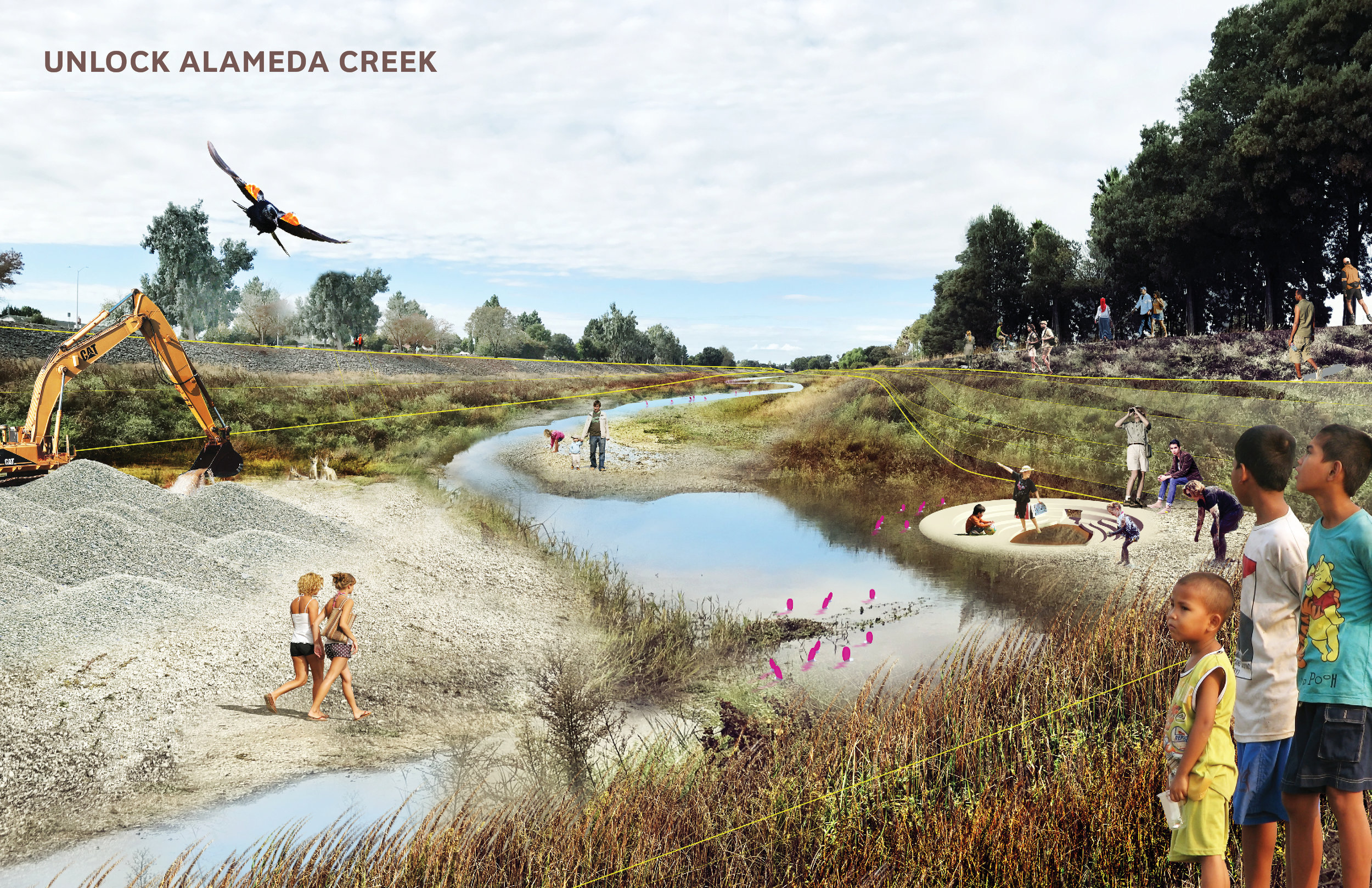On March 29, 2022, Adam Marcus delivered a lecture “Ecological Tectonics” at Florida International University School of Architecture as part of their spring 2022 public lecture series.
Ikeda and Jones Present at UC Davis Symposium
On November 19, Margaret Ikeda and Evan Jones presented AEL research at the symposium “A Living Atlas: Community-sourced Design for Citizen Science” at the University of California, Davis. The presentation included an overview of AEL research projects, including the Buoyant Ecologies Float Lab, the Presidio Culvert Reef and the work with the Treasure Island Sailing Club’s “Sailing to Save the Sea” science education program. The latter involves an ongoing collaboration with Adam Larson from Stanford University’s Prakash Lab deploying their PlanktoScope to survey microscopic aquatic life. Larson also presented at the symposium, along with CCA student Yitian Ma (B.Arch 2022), who shared the “Living Pod” project developed in 2019 Constructed Ecologies class for the 2019 BioDesign Challenge. This project incorporated a floating PlanktoScope capable of autonomous monitoring of plankton and microplastics, which is being developed in conjunction with Adam Larson at the Autodesk Technology Center in San Francisco.
Ikeda and Jones Present at Maldives Villa College
Margaret Ikeda and Evan Jones recently participated in an international conference on social research and innovation at Villa College in the Maldives. Profs. Ikeda and Jones were invited to present their Buoyant Ecologies Maldives studio work from CCA and the University of Washington. The conference, titled “Building Back Better: A Resilient Future for All,” explored responses to threats of sea level rise affecting the Maldives and looked at the potential for floating architecture and regenerative infrastructures to create adaptable solutions for local islands.
Roberts and Falliers Present at ASLE Conference
From July 26- August 6, the Association for the Study of Language and the Environment (ASLE.org) convened its biannual international conference, titled EMERGENCE(Y). On August 4, Leslie Carol Roberts and Christopher Falliers, founders of the ECOPOESIS Project with Adam Marcus, presented on the panel “The Art(s) of Environmental Change,” alongside John Yunker, Ashland Press; Michael Hewson, CQUniversity; and the independent artists Sarah Crooks, and Beth Shepherd. In their paper, “How We Hear Now: Spatial Practice and the Materiality of Ecological Stories,” Roberts and Falliers discussed the concept and creation of How We Hear Now, the collective audio project begun in response to the human quieting of the world as the pandemic descended in 2020 and lockdown ensued.
A complete list of conference abstracts and contributors are available here. ASLE was founded to inspire and promote intellectual work in the environmental humanities and the arts, supporting research, education, literature, environmental justice, and ecological sustainability.
Architectural Ecologies Lab Team Presents at Biodesign Challenge 2021
On June 21, 2021 a three-student team from the Fall 2020 Constructed Ecologies class presented their project Urchigami at the 2021 BioDesign Challenge. This was the third consecutive year that the class, taught by Margaret Ikeda and Evan Jones, entered the competition. The project explored folded shell designs and biocementation using calcium carbonate and living algae. The team consisted of Geetika Rohra (MArch’21), Nidhi Patel (BArch’21), and Lina Kudinar (MArch’21). Working in consultation with previous collaborators at UCSF microbiology labs and environmental engineering professor Dr. Varenyam Achal from Guangdong Technion – Israel Institute of Technology, the project was developed in the spring semester and featured on the SeaShift Collaborative website (seashift.org)
Adam Marcus Presents Virtual Visit to the Float Lab at the Proxy Festival
On May 14, 2021, Adam Marcus participated in the Proxy Festival, a unique event organized by the McLuhan Centre for Culture and Technology at the University of Toronto and hosted by Simon Frasier University’s School of Communication. The festival was organized as an online event exploring our always-online moment and the possibilities that networked experience can offer for the creation of new forms of cultural practice, of embodiment, of place-making, and of experimentation with social conventions. Adam presented a short film that provided a remote, virtual visit to the Buoyant Ecologies Float Lab, which currently floats off in San Francisco Bay off of the Oakland shoreline.
Roberts and Falliers Keynote Ecological Arts Therapies Conference in St. Petersburg, Russia
On August 8, 2020, Professors Leslie Carol Roberts and Chris Falliers delivered a keynote presentation for the The First International Conference for Ecological Arts Therapies, via Zoom in St. Petersburg, Russia. As part of the keynote, Roberts and Falliers (with Adam Marcus, co-founders of The Ecopoesis Project) presented How We Hear Now, a collaborative artwork launched on Earth Day, 2020.
The conference theme “Ecological/Earth-Based Arts Therapies: International and Multi-Cultural Perspectives" aligned with the ambitions and framework of The Ecopoesis Project. In their talk, Roberts and Falliers discussed how the project generates knowledge and interdisciplinary forms of practice and pedagogy around questions of ecologies that challenge disciplinary norms. They discussed the genesis of the project, its first two iterations: the 2019 gathering of invited guests from across disciplines and How We Hear Now, the 2020 sound and art installation responding to the ecology of pandemic.
An excerpt from the presentation:
Our hope is to build a work that is a tonic towards healing obliviousness—obliviousness to our shared circumstances, which includes nonhumans, from the penguins to the coral to the bivalves that cluster on floating substrate. By creating assemblies where we can be vulnerable, we press forward towards a condition of susceptibility towards ideas for how to change and heal things on Planet Earth. And Earth needs this sort of tenderness now, after hundreds of years of human-lead exploitation. And we propose that the meandering path there comes in allowing grief, sadness, joy, melancholy, weirdness, hilarity, humility to weave together.
As artists, designers, and writers, we are attuned to how things are and then we push this attunement towards a collaborative. In this, we are collectors of ideas rather than self-tasked towards generating “original ideas.”
We argue that design and art and writing can gather a collective of voices to consider—even try to understand—complex emotions associated with the climate emergency, like grief and love. That is, we invite participants to have more naked reactions to the realities of these times. So much of ecological conversation has been dominated by doomsday philosophizing and corporate-speak, both of which often point to humans as the “problem.” But what if instead we use awareness and art to look tenderly and with desire at our shared reality of living together with nonhumans in a climate emergency? In 2020, we focused on what it felt like to experience local and nonlocal ecologies within a time of pandemic, such an extreme form of environmental isolation.
Adam Marcus Presents at Columbia University GSAPP
On February 7, Adam Marcus presented the Buoyant Ecologies Float Lab project at Columbia University Graduate School of Architecture, Planning and Preservation, as part of a panel featuring recipients of the 2019-2020 GSAPP Incubator Prize.
Margaret Ikeda Presents at ACSA Administrators Conference in New Orleans
On November 9, Margaret Ikeda presented the Buoyant Ecologies research at the 2019 ACSA Administrators Conference “UNCERTAINTY” at Tulane University in New Orleans, LA. Margaret presented as part of the panel “Water Scarcity, Flood, and Climate Change,” organized by Dr. Adrian Parr, Dean of the College of Architecture, Planning and Public Affairs at the University of Texas at Arlington.
Margaret Ikeda Presents Research in Warsaw, Poland
On October 14-16, Margaret Ikeda presented the Buoyant Ecologies research as one of the Plenary Speakers at the International Conference on Amphibious Architecture, Design and Engineering at Warsaw University of Technology in Poland.
Marcus, Roberts, and Falliers Present at Next Earth Conference at UCSB
Architectural Ecologies Lab faculty Adam Marcus, Leslie Carol Roberts, and Chris Falliers are participating this month in the conference Next Earth: Teaching Climate Change Across the Disciplines, hosted by the Environmental Humanities Initiative at the University of California, Santa Barbara. The conference brings together critical climate and sustainability educators of every discipline, from the arts and humanities to the human and social sciences and the natural sciences, with a focus on sharing ideas to accelerate climate education and action in California and beyond. The conference is nearly carbon-neutral in that it takes place online and greatly reduces the enormous carbon footprint of the typical academic conference.
Marcus, Roberts, and Falliers are presenting The Ecopoesis Project, a a multi-year sequence of collaborative, interdisciplinary think-tanks exploring front-line concerns around ecology, climate, and spatial expression. Their presentation “The Ecopoesis Project: Advocating Logics of Future Coexistence” is part of the “Creative Pedagogies of Climate Change” panel and can be viewed online.
Adam Marcus, Margaret Ikeda, and Evan Jones to Present at UC Davis
On Wednesday, February 21, CCA faculty Adam Marcus, Margaret Ikeda, and Evan Jones will present the work of the Architectural Ecologies Lab as part of "Field Dispatches from Resilient By Design" panel discussion at the University of California, Davis.
Adam Marcus Presents at University of Sydney
On December 13, Adam Marcus presented the paper "Buoyant Ecologies: Material Logics for Sea Level Rise Adaptation" at the conference Sustaining the Seas: Fish, Oceanic Space, and the Politics of Caring at the University of Sydney in Australia. The paper presents the material-driven research of the Buoyant Ecologies project. The research brings together architects, marine ecologists, fabricators, and public agencies to develop innovative strategies for designing and constructing ecologically sensitive waterfront structures.
The conference, hosted by the University of Sydney Sustainable Fish Lab, features a range of speakers, including scientists, activists, and artists. For more information, see the conference website.
Public Sediment Presents Design Concepts
On November 15, Public Sediment, one of ten teams selected for the Resilient By Design Bay Area Challenge, presented research and design concepts to a public audience at the Contemporary Jewish Museum in San Francisco.
The team presented three proposals for investing in the San Francisco Bayland ecosystems to buffer vulnerable communities and species from the threats of sea level rise. The proposals incorporate research into ecologically performative materials, floating breakwaters, and aquatic species that CCA faculty Adam Marcus, Margaret Ikeda, and Evan Jones have been developing as part of the Buoyant Ecologies project. All projects are posted here and open to public feedback and comment until December 7, 2017.
Public Sediment is a multidisciplinary design team that views sediment as a core building block of resilience in San Francisco Bay. The team is led by SCAPE Landscape Architecture and includes the Buoyant Ecologies team, the Dredge Research Collaborative, Arcadis, TS Studio, the UC Davis Department of Human Ecology and Design, and the UC Davis Center for Watershed Sciences.
Buoyant Ecologies Research Presented at Designing Material Innovation Symposium
On October 27, CCA faculty Adam Marcus, Margaret Ikeda, and Evan Jones presented the Buoyant Ecologies Float Lab at the "Designing Material Innovation" symposium at California College of the Arts in San Francisco. The symposium convened leading figures from multiple fields to discuss projects that exemplify new approaches to material, fabrication, and design. The presentations and panels featured nationally and internationally distinguished speakers from architecture, engineering, industry, and materials science. The symposium was organized by Jonathan Massey of the University of Michigan's Taubman College and included a keynote presentation by Philippe Block of ETH Zurich. Presenters included Michael Bell of Columbia University, Michelle Kauffman of Google, Matthias Kohler of Gramazio Kohler, and many more.
















